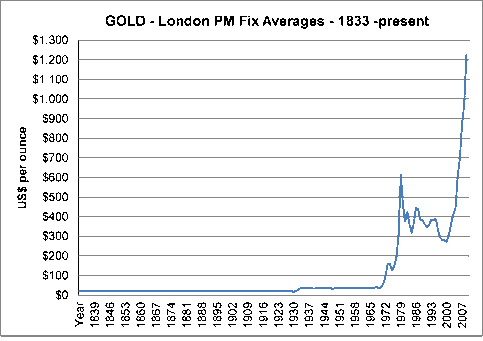People say that huge deficits are necessary, so that the good Obama-mama can spend dollars on us, poor souls, who would've otherwise been raped and robbed and (include your own verb) by the big evil corporations.
Let's look at the facts. The dollar lost 90-95% of its value (depending on how you count it):
Why does it lose its value? Because the Federal Reserve doesn't need to back the dollar with gold, so it can print any amount of dollars without having to produce the gold to back it up.
TARP
Fed gives $7.77 trillion to banks
The dollar has become nothing more than a piece of paper that everyone in the world agrees to use as tender. There's nothing forcing them to do so; the Chinas and the Irans of the world could establish their own banking systems that rely on other currencies, like gold or yuans. I suspect that the main factor really keeping them from doing it is their incompetence.
You might think that printing dollars is fine, because the federal government is now able to invest that money into our economy by means of building roads and schools, etc., things that benefit all of us who live here. That's not entirely true though. Yes, the federal government does spend money on a number of important things, but, it makes enough money in tax receipts to pay for all those essential services. One would argue that highways and schools and hospitals need to be completely privatized so we don't rely on the political wind of the day when it comes to those essentials, but the fact of the matter is that the federal government has enough money to pay for what we, ordinary citizens and residents, need.
You would ask then, why does it need to print money? Or, what's the justification that we get from them? Well, there's no simple answer here. It's partially entitlements (Medicare-big pharma), partially military (MIC, military industrial complex, the Lockheed Martins and the Raytheons), partially useless economy interventions (loan guarantees, subsidies, etc.), and last but not least, the fraud that's associated with all of the above.
I'd like to elaborate on the last, fraud part.What does that mean? Let's say, the gov't decides to build completely un-called for F-35 which would carry a market price tag of $50 million per unit (assuming minimum waste and some reasonable marginal profit for the manufacturer). That $50 million is a waste, because F-35s are meant to fight big wars with big superpowers like China and Russia, and that's an utopia because all powerful nations have nukes anyways and the conventional power is not really relevant anymore since the 50s and 60s.
Now, because the government as it is today is corrupt, the price tag is not $50 million, but $100 million. (Again, these are not actual numbers - I'm just trying to demonstrate the idea here.) The second $50 million is "pure waste", meaning that aside from the fact that F-35s are not really needed, we spend an additional $50 million per unit due to government corruption. Basically, the contractor says "oh, it's actually going to be extra $2 billion", and the gov't automatically agrees to pay that (you're not really paying attention to the noise Congress makes, right? I should've actually said congress - they don't deserve to be capitalized anymore.)
So in general, the government tells us that it needs to protect us, treat our diseases, improve our quality of life, and to do all that, it needs to give big piles of cash to people that are close to the government. Which is not fair, but again, you would ask, what does it matter? They're not taxing me, they're creating new money, so it will eventually benefit the economy, right?
Wrong. In addition to choking the economy due to very high levels of corruption associated with the way the gov't operates today, every dollar printed is a dollar stolen from the economy. Let's say, we have 1,000 people in our economy, each of those people have $10. That means the total money mass is $10,000. It also means that $10,000 is a monetary representation of all the goods the economy produces. If the economy produces 10,000 loafs of bread, it translates into $1 buying 1 loaf of bread, for example.
Now, if the government prints new $10,000 and gives it to John, John now has $10,010, which obviously makes him very rich. Good for John, but since we have now $20,000 for our total money mass, and we're still producing 10,000 loafs of bread (obviously, printint money happens over night, and increasing bread production doesn't), a loaf of bread now costs $2. So while John got very very rich, the other 999 people who don't get "new money" from the government, got screwed. They still have $10 each, but since $10 only buys 5 breads now, that means they actually have $5 each now, using pre-printing dollar rate. John is not as rich he may think he is either; $10,010 that he has only buy 5,005 breads, because the devaluation affects him just like everyone else.
The government printing $10,000 and giving it to John is the same as the government confiscating (stealing) $5 from everyone and then giving it to John. If government did that, John would then have $5005, which also buys 5005 breads, since we had no devaluation of money. Only difference - by stealing $5 from everyone to give to John, the gov't makes it obvious. But by printing $10,000, it can claim that it's doing it for the greater good, and that it benefits us, and that we're all better off as the result. Different publicity, same result.

No comments:
Post a Comment